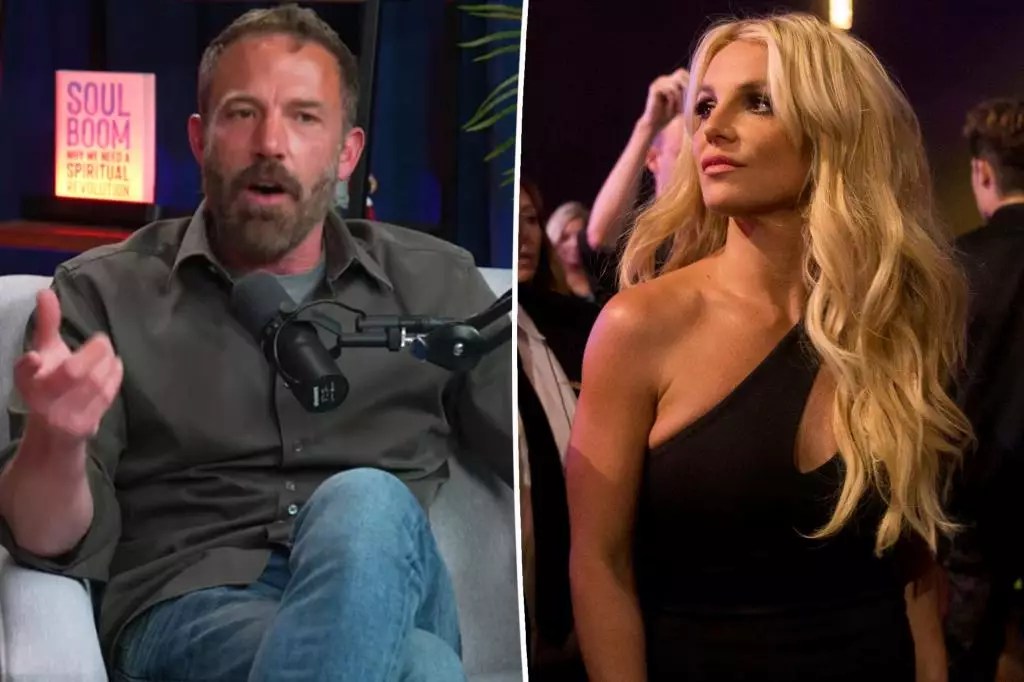In an age dominated by social media and relentless scrutiny, the burden of celebrity status can be both a blessing and a curse. Recently, Ben Affleck shed light on this often harsh reality while discussing his past sympathy for Britney Spears on the podcast “This Past Weekend With Theo Von.” His reflections remind us that fame comes with a price, one that is often paid in terms of mental health and personal struggles. The exposure and attention bestowed upon celebrities can morph into a double-edged sword, cutting deeper than most realize.
Affleck’s candid remarks indicate that he was deeply moved by the way Spears, a pop icon, was subjected to ceaseless harassment by paparazzi during tumultuous periods in her life. He expressed a sincere compassion for her plight, suggesting a level of understanding that often escapes those who observe from a distance. His recollection—while vague—resonates with a collective memory of a star being relentlessly chased, pushed to the brink, and ultimately misunderstood. The implications of such a rigorous public eye are profound, often leaving mental scars that last far longer than fleeting tabloid headlines.
The Machinery of Harassment
Affleck’s observations unveil a grim dynamic where the personal suffering of a celebrity is often commodified for entertainment. He articulated a critical point about the “cultivation of cruelty” that surrounds public figures, where the emotional toll they endure is overshadowed by sensationalist media narratives. This relentless pursuit by photographers creates a façade, a distorted image of celebrities as they struggle under the weight of public expectation and scrutiny. Affleck’s analogy of the “growling animal” encapsulates this perfectly; we see the anger and frustration, with little recognition of the provocation behind it.
The scenario surrounding Britney Spears during her notorious 2007 breakdown serves as a poignant case study of this phenomenon. This tragic moment in her life marked an intersection of personal turmoil and public spectacle, where her misfortunes were reduced to mere gossip fodder. Instead of receiving empathy, she was treated as entertainment, her vulnerabilities laid bare for the world to gawk at and derive laughter, clicks, or likes from. As Affleck pointed out, this cycle of harassment can exacerbate an already difficult situation, spiraling into a frenzy that leaves celebrities even more agitated and misunderstood.
Compassion in Celebrity Culture
Affleck’s dialogue reflects a deeper yearning for empathy in a culture that thrives on celebrity gossip. His perspective illustrates how public figures are often treated as caricatures rather than complex human beings facing genuine challenges. In expressing compassion for Spears, Affleck invites the public to reconsider the narratives they consume and the consequences of their consumption. It brings to light a necessary conversation about the responsibilities of the media and the audience in portraying and perceiving the lives of increasingly scrutinized individuals.
The actor also highlights an interesting dichotomy—the notion that despite our fascination with celebrities, we often fail to see them as relatable people. This offers a fresh perspective on the emotional burdens faced by the likes of Spears. Moments of joy in their lives can be overshadowed by relentless negativity, leading to severe repercussions for their mental health. The public’s voyeuristic tendencies must be counterbalanced with an understanding of the human experience, which is frequently obscured behind flashing cameras and viral tweets.
Revisiting Relationships and Realities
Interestingly, Affleck also responded to a claim by Spears regarding a past romantic encounter, which adds another layer to this intricate narrative. While he remained evasive about their alleged interaction, this anecdote serves to illustrate the complexities of historical relationships within a high-pressure celebrity environment. It draws attention to the fragile nature of human memories, particularly when subjected to the whims of media scrutiny. The past can become distorted, reshaped by public perception, leading to further misunderstanding and sometimes even conflict.
Ultimately, Affleck’s reflections beckon audiences to tread lightly in a world where celebrity culture often mirrors a gladiatorial arena. The complexities of mental health, empathy, and human connection must steer our narratives away from sensationalism towards a more compassionate understanding. Recognizing the individuals behind the headlines is essential, encouraging a culture that celebrates sensitivity over scrutiny. This is a call to action for both consumers and creators of media to cultivate a more empathetic view of those we often idolize, but rarely understand.


Leave a Reply